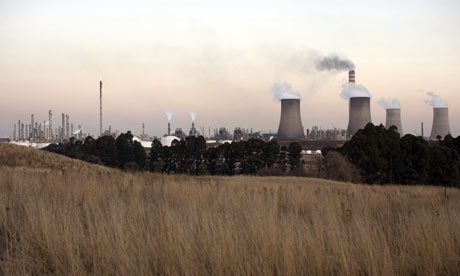Climate chief Jonathan Pershing defends abstention on World Bank loan for controversial power station while holding country to account for carbon emissions

A Sasol coal-to-liquid fuel plant in Secunda, South Africa, the world's single largest emitter of carbon dioxide on the planet. Illustration: Per-Anders Pettersson/Getty Images
The Obama administration said today it intends to hold South Africa to its promise to act on climate change a week after the country secured $3.75bn funds to build one of the world's biggest coal plants.
In an appearance before Congress, Jonathan Pershing, the deputy special envoy for climate change, said the Obama administration would hold South Africa responsible for a rise in greenhouse gas emissions from the controversial project by the state-owned Eskom utility.
"We do intend to hold people accountable for green house gas emissions associated with these kinds of projects," Pershing told the house subcommittee on Africa.
But he defended the administration's decision to abstain on last week's World Bank vote to fund the Medupi power station. Democratic leaders in the Senate had called on the administration to try to block the deal, and the treasury department was very critical of the project.
"Why did we not just vote now? We did not vote no because at the end of the day there is a very clear ongoing development need in the continent," Pershing said.
South Africa, in the run-up to the Copenhagen summit, committed to a 34% reduction in business as usual emissions by 2020 and a 42% by 2025. Both targets are put in jeopardy by the plant, environmentalists say.
But Pershing's comments align with the Obama administration's policy of shifting some of the burden for dealing with climate change from the industrialised countries which have historically caused most emissions to rapidly emerging countries, such as South Africa, India, China and Brazil.
In the administration's view, that shared burden also applies to climate aid. Countries that oppose or reject the Copenhagen accord will not be in line for the $10bn a year the rich countries are mobilising to help ppor countries adjust to climate change.
The administration has denied funding to Ecuador and Bolivia, it emerged last week. Other countries could also be penalised if they register strong opposition to the agreement, Pershing told the Guardian.
"We are not saying that if you are not signed on to the deal you will not get funding," he said. "We are saying that if you actively oppose or reject the deal [you will not get funding]," he said.
Earlier, the house was told that the administration hopes to step up climate aid to the poor countries and small island states that will suffer the worst consequences of extreme warming.
Africa will get a growing share of such aid. Pershing in prepared testimony said the Obama administration was seeking $1.4bn in climate aid for 2011, of which 30% would go to African countries.
He also said that the administration was putting more focus on climate change in other aid projects, especially potential for water shortages.
As with most events in Congress touching on the environment, today's committee had its resident climate sceptic expressing doubts about the science.
Chris Smith, a Republican from New Jersey, was dogged in expressing concern that climate change was a ruse to force African women to use birth control and have abortions.
He repeatedly referred to African children as "carbon breeders", at least, he implied, in the eyes of those concerned about climate change.
"If we blame the child as a carbon breeder for climate issues I think we are going down the wrong path," Smith said.
No comments:
Post a Comment